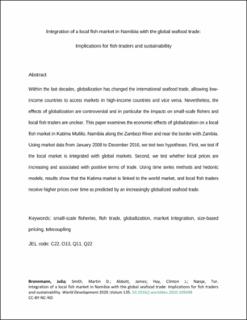Integration of a local fish market in Namibia with the global seafood trade: Implications for fish traders and sustainability
Peer reviewed, Journal article
Accepted version

Åpne
Permanent lenke
https://hdl.handle.net/11250/2675172Utgivelsesdato
2020Metadata
Vis full innførselSamlinger
- Publikasjoner fra CRIStin - NINA [2364]
- Scientific publications [1392]
Originalversjon
10.1016/j.worlddev.2020.105048Sammendrag
Within the last decades, globalization has changed the international seafood trade, allowing low-income
countries to access markets in high-income countries and vice versa. Nevertheless, the effects of globalization
are controversial and in particular the impacts on small-scale fishers and local fish traders are
unclear. This paper examines the economic effects of globalization on a local fish market in Katima
Mulilo, Namibia along the Zambezi River and near the border with Zambia. Using market data from
January 2008 to December 2016, we test two hypotheses. First, we test if the local market is integrated
with global markets. Second, we test whether local prices are increasing and associated with positive
terms of trade. Using time series methods and hedonic models, results show that the Katima market is
linked to the world market, and local fish traders receive higher prices over time as predicted by an
increasingly globalized seafood trade.
